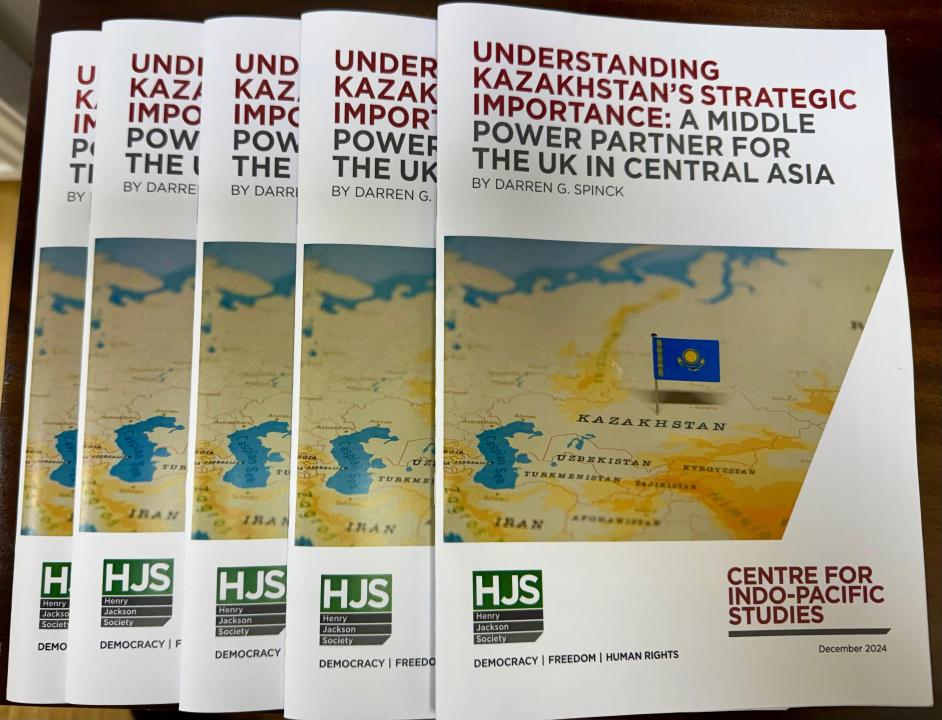ASTANA – The British think tank the Henry Jackson Society presented a research report titled Understanding Kazakhstan’s Strategic Importance: A Middle Power Partner for the UK in Central Asia, in the United Kingdom Parliament on Dec. 10 in London.

Report’s main goal was to review Kazakhstan’s evolving role on the international stage as a middle power, along with its progress in political reforms and sustainable economic development. Photo credit: Kazakh Foreign Ministry.
Presenting the report, the Henry Jackson Society’s associate research fellow and author of the report, Darren Spinck, emphasized that its main goal was to review Kazakhstan’s evolving role on the international stage as a middle power, along with its progress in political reforms and sustainable economic development. The research on the report also focused on the potential for strengthening mutually beneficial trade and investment cooperation between the U.K. and Kazakhstan, particularly in critical minerals and transit-transport routes. The author further offered recommendations to the British Government and Parliament for enhancing the partnership between London and Astana, reported the Kazakh Foreign Ministry’s press service.
The Principal Deputy Speaker of the House of Commons, Nusrat Ghani MP, highly praised the bilateral cooperation between Kazakhstan and the U.K. She mentioned her direct involvement in strengthening British-Kazakh relations as the Business and Trade Minister in 2022-2024 and Minister of State at the Foreign Office this year. She expressed confidence that the report would serve as a valuable resource for members of the U.K. Parliament in understanding Kazakhstan’s significance as an international player and as London’s key partner in Central Asia. Ghani also expressed her readiness to endorse inter-parliamentary ties between the two nations.
Kazakh Ambassador to the U.K., Magzhan Ilyassov, welcomed the timely publication of the report on Kazakhstan and underscored the significance of its presentation in the British Parliament. In his remarks, he highlighted Kazakhstan’s growing role on the international stage as a middle power. Ilyassov emphasized that Kazakhstan’s balanced, constructive and multi-vector foreign policy protects national interests and promotes global security and dialogue. He also provided insights into Kazakhstan’s international initiatives on nuclear non-proliferation and proposals to create the International Agency for Biological Safety and establish the UN Regional Hub for SDGs in Central Asia and Afghanistan.
The Director for Eurasia Infrastructure at the European Bank for Reconstruction and Development (EBRD), Ekaterina Miroshnik, discussed the role of the Trans-Caspian International Transport Route (TITR), also known as the Middle Corridor, which passes through Kazakhstan and connects China with Europe. She also highlighted the EBRD’s active involvement in projects related to the Middle Corridor, which helps strengthen trade ties between Europe, Central Asia and China.
Enzo Satkuru-Granzella, a U.K. Critical Minerals Association business analyst, pointed out Kazakhstan’s potential to contribute to the global critical minerals supply chain. He noted that Kazakhstan has a unique resource base, necessary infrastructure and skilled workforce. Satkuru-Granzella added that the Roadmap on critical minerals signed between Kazakhstan and the U.K. in March in London lays a solid foundation for a long-term mutually beneficial partnership.
In conclusion, the participants acknowledged Kazakhstan’s increasing geostrategic role as a middle power and discussed new ways to strengthen the partnership between Kazakhstan and the U.K.
The Henry Jackson Society is a British think tank focused on foreign policy, national security, democracy and human rights. Established in 2005 at the University of Cambridge, it is named after U.S. Senator Henry Jackson, who served from 1953 to 1983 and is known for his strong national security policies. The society conducts research and publishes reports aimed at shaping international relations and security policies and promoting democracy and human rights worldwide.
